Take-home Exam: Aquinas and Anselm's Arguments on God's Existence
VerifiedAdded on 2022/09/09
|6
|1318
|14
Homework Assignment
AI Summary
This assignment explores the arguments of Thomas Aquinas and Saint Anselm regarding the existence of God, focusing on their key ideas, objections, and differences. Aquinas's Five Ways, particularly the argument from a necessary being, are examined alongside Anselm's ontological argument. The paper also discusses Augustine's views on the origin of evil and his pear theft story, analyzing the concept of evil and its relation to God's creation. Furthermore, the assignment delves into the concepts of truth and freedom in Aquinas's philosophy, contrasting his and Anselm's perspectives on free will and moral obligation. The student provides a detailed analysis of the philosophical concepts, referencing relevant texts and providing clear explanations of complex ideas, as requested in the assignment brief.
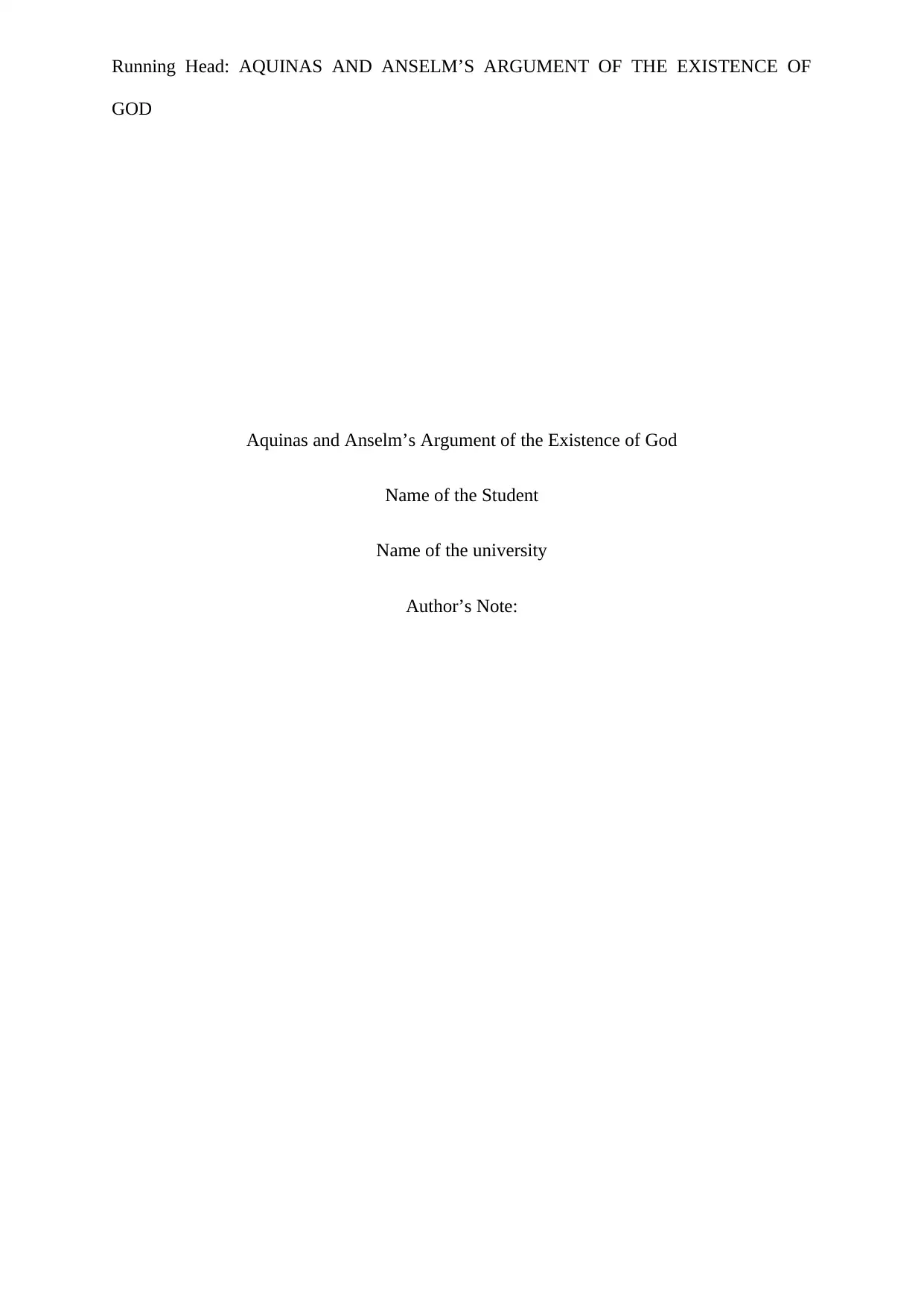
Running Head: AQUINAS AND ANSELM’S ARGUMENT OF THE EXISTENCE OF
GOD
Aquinas and Anselm’s Argument of the Existence of God
Name of the Student
Name of the university
Author’s Note:
GOD
Aquinas and Anselm’s Argument of the Existence of God
Name of the Student
Name of the university
Author’s Note:
Paraphrase This Document
Need a fresh take? Get an instant paraphrase of this document with our AI Paraphraser
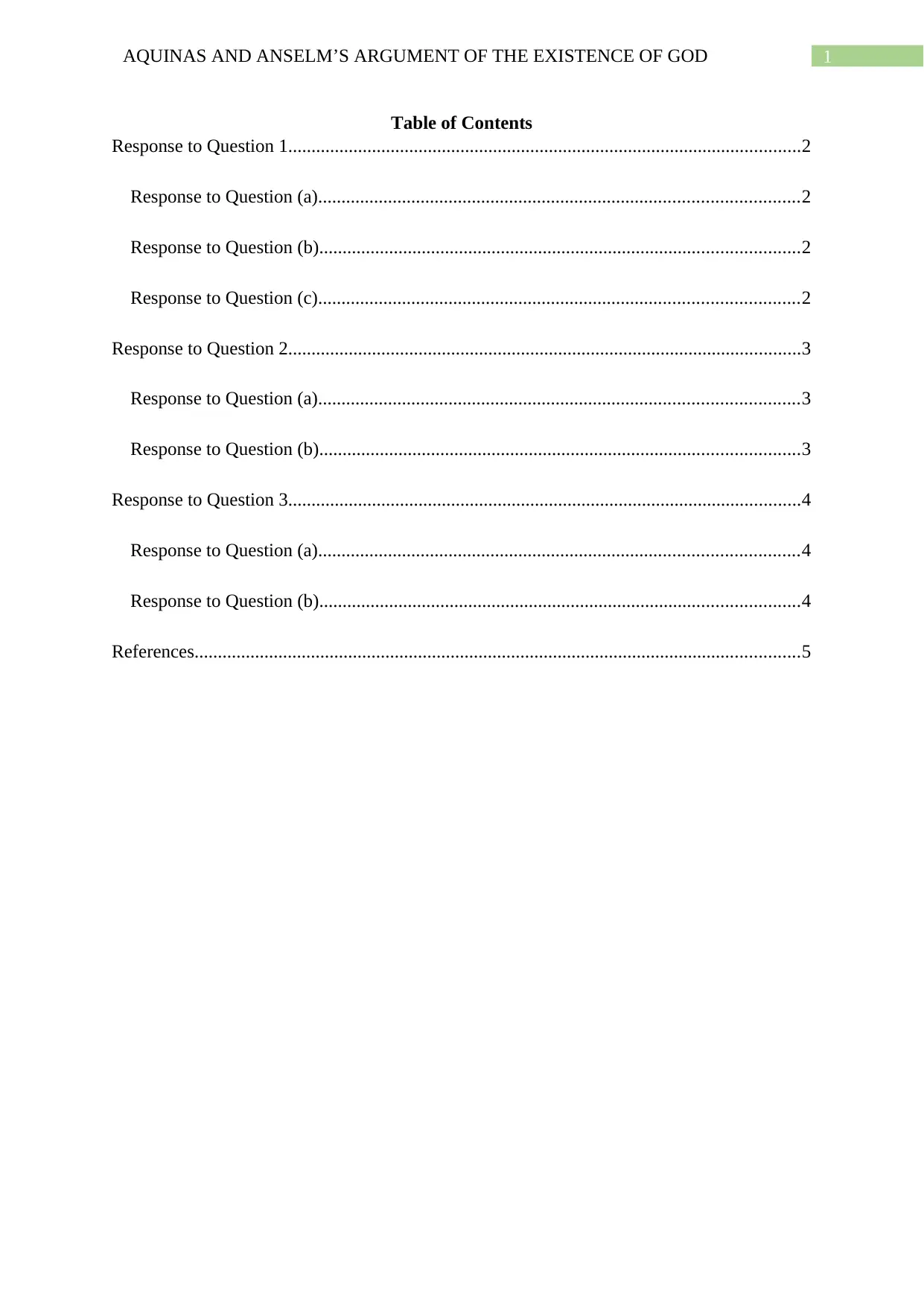
1AQUINAS AND ANSELM’S ARGUMENT OF THE EXISTENCE OF GOD
Table of Contents
Response to Question 1..............................................................................................................2
Response to Question (a).......................................................................................................2
Response to Question (b).......................................................................................................2
Response to Question (c).......................................................................................................2
Response to Question 2..............................................................................................................3
Response to Question (a).......................................................................................................3
Response to Question (b).......................................................................................................3
Response to Question 3..............................................................................................................4
Response to Question (a).......................................................................................................4
Response to Question (b).......................................................................................................4
References..................................................................................................................................5
Table of Contents
Response to Question 1..............................................................................................................2
Response to Question (a).......................................................................................................2
Response to Question (b).......................................................................................................2
Response to Question (c).......................................................................................................2
Response to Question 2..............................................................................................................3
Response to Question (a).......................................................................................................3
Response to Question (b).......................................................................................................3
Response to Question 3..............................................................................................................4
Response to Question (a).......................................................................................................4
Response to Question (b).......................................................................................................4
References..................................................................................................................................5
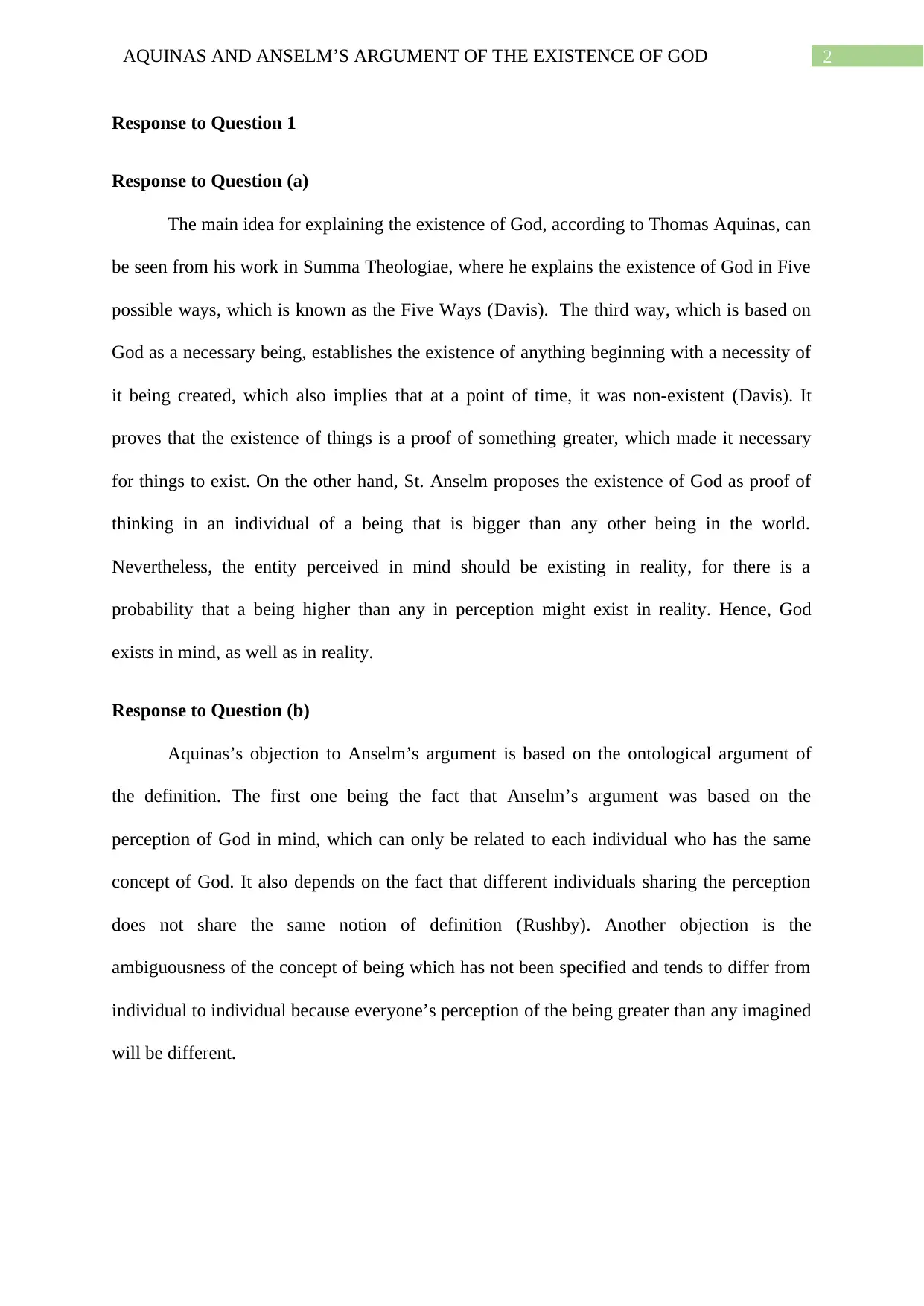
2AQUINAS AND ANSELM’S ARGUMENT OF THE EXISTENCE OF GOD
Response to Question 1
Response to Question (a)
The main idea for explaining the existence of God, according to Thomas Aquinas, can
be seen from his work in Summa Theologiae, where he explains the existence of God in Five
possible ways, which is known as the Five Ways (Davis). The third way, which is based on
God as a necessary being, establishes the existence of anything beginning with a necessity of
it being created, which also implies that at a point of time, it was non-existent (Davis). It
proves that the existence of things is a proof of something greater, which made it necessary
for things to exist. On the other hand, St. Anselm proposes the existence of God as proof of
thinking in an individual of a being that is bigger than any other being in the world.
Nevertheless, the entity perceived in mind should be existing in reality, for there is a
probability that a being higher than any in perception might exist in reality. Hence, God
exists in mind, as well as in reality.
Response to Question (b)
Aquinas’s objection to Anselm’s argument is based on the ontological argument of
the definition. The first one being the fact that Anselm’s argument was based on the
perception of God in mind, which can only be related to each individual who has the same
concept of God. It also depends on the fact that different individuals sharing the perception
does not share the same notion of definition (Rushby). Another objection is the
ambiguousness of the concept of being which has not been specified and tends to differ from
individual to individual because everyone’s perception of the being greater than any imagined
will be different.
Response to Question 1
Response to Question (a)
The main idea for explaining the existence of God, according to Thomas Aquinas, can
be seen from his work in Summa Theologiae, where he explains the existence of God in Five
possible ways, which is known as the Five Ways (Davis). The third way, which is based on
God as a necessary being, establishes the existence of anything beginning with a necessity of
it being created, which also implies that at a point of time, it was non-existent (Davis). It
proves that the existence of things is a proof of something greater, which made it necessary
for things to exist. On the other hand, St. Anselm proposes the existence of God as proof of
thinking in an individual of a being that is bigger than any other being in the world.
Nevertheless, the entity perceived in mind should be existing in reality, for there is a
probability that a being higher than any in perception might exist in reality. Hence, God
exists in mind, as well as in reality.
Response to Question (b)
Aquinas’s objection to Anselm’s argument is based on the ontological argument of
the definition. The first one being the fact that Anselm’s argument was based on the
perception of God in mind, which can only be related to each individual who has the same
concept of God. It also depends on the fact that different individuals sharing the perception
does not share the same notion of definition (Rushby). Another objection is the
ambiguousness of the concept of being which has not been specified and tends to differ from
individual to individual because everyone’s perception of the being greater than any imagined
will be different.
⊘ This is a preview!⊘
Do you want full access?
Subscribe today to unlock all pages.

Trusted by 1+ million students worldwide
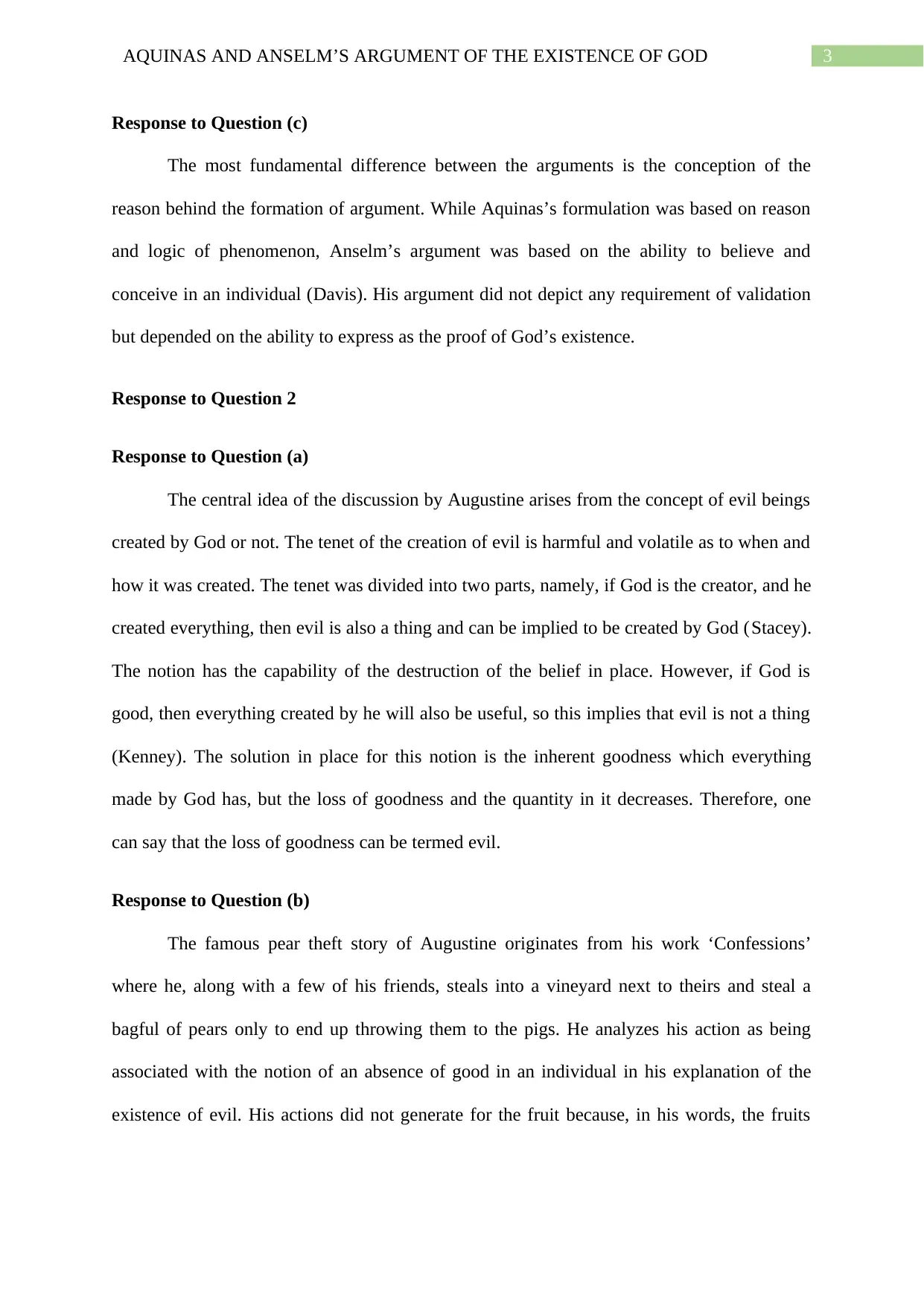
3AQUINAS AND ANSELM’S ARGUMENT OF THE EXISTENCE OF GOD
Response to Question (c)
The most fundamental difference between the arguments is the conception of the
reason behind the formation of argument. While Aquinas’s formulation was based on reason
and logic of phenomenon, Anselm’s argument was based on the ability to believe and
conceive in an individual (Davis). His argument did not depict any requirement of validation
but depended on the ability to express as the proof of God’s existence.
Response to Question 2
Response to Question (a)
The central idea of the discussion by Augustine arises from the concept of evil beings
created by God or not. The tenet of the creation of evil is harmful and volatile as to when and
how it was created. The tenet was divided into two parts, namely, if God is the creator, and he
created everything, then evil is also a thing and can be implied to be created by God (Stacey).
The notion has the capability of the destruction of the belief in place. However, if God is
good, then everything created by he will also be useful, so this implies that evil is not a thing
(Kenney). The solution in place for this notion is the inherent goodness which everything
made by God has, but the loss of goodness and the quantity in it decreases. Therefore, one
can say that the loss of goodness can be termed evil.
Response to Question (b)
The famous pear theft story of Augustine originates from his work ‘Confessions’
where he, along with a few of his friends, steals into a vineyard next to theirs and steal a
bagful of pears only to end up throwing them to the pigs. He analyzes his action as being
associated with the notion of an absence of good in an individual in his explanation of the
existence of evil. His actions did not generate for the fruit because, in his words, the fruits
Response to Question (c)
The most fundamental difference between the arguments is the conception of the
reason behind the formation of argument. While Aquinas’s formulation was based on reason
and logic of phenomenon, Anselm’s argument was based on the ability to believe and
conceive in an individual (Davis). His argument did not depict any requirement of validation
but depended on the ability to express as the proof of God’s existence.
Response to Question 2
Response to Question (a)
The central idea of the discussion by Augustine arises from the concept of evil beings
created by God or not. The tenet of the creation of evil is harmful and volatile as to when and
how it was created. The tenet was divided into two parts, namely, if God is the creator, and he
created everything, then evil is also a thing and can be implied to be created by God (Stacey).
The notion has the capability of the destruction of the belief in place. However, if God is
good, then everything created by he will also be useful, so this implies that evil is not a thing
(Kenney). The solution in place for this notion is the inherent goodness which everything
made by God has, but the loss of goodness and the quantity in it decreases. Therefore, one
can say that the loss of goodness can be termed evil.
Response to Question (b)
The famous pear theft story of Augustine originates from his work ‘Confessions’
where he, along with a few of his friends, steals into a vineyard next to theirs and steal a
bagful of pears only to end up throwing them to the pigs. He analyzes his action as being
associated with the notion of an absence of good in an individual in his explanation of the
existence of evil. His actions did not generate for the fruit because, in his words, the fruits
Paraphrase This Document
Need a fresh take? Get an instant paraphrase of this document with our AI Paraphraser
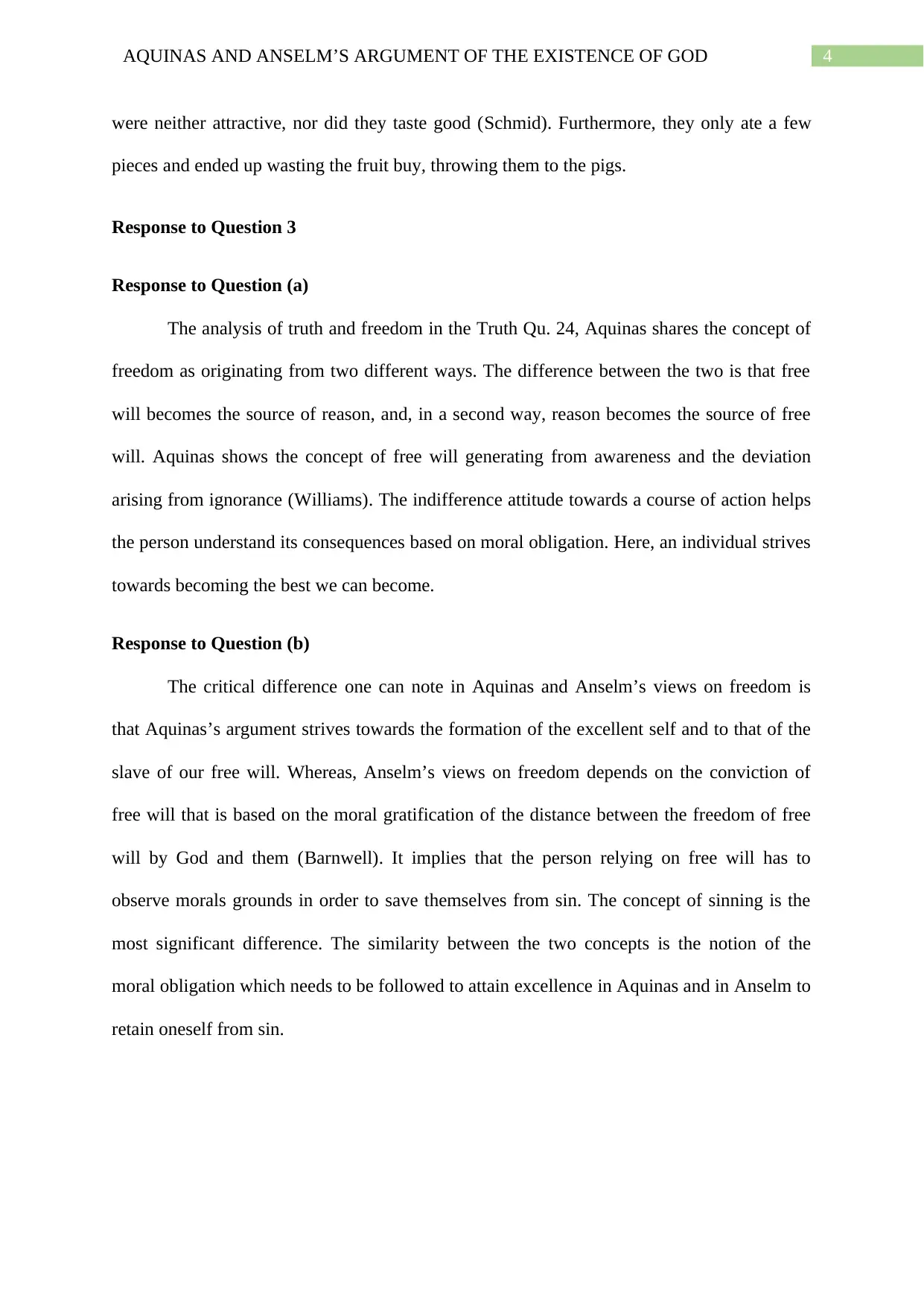
4AQUINAS AND ANSELM’S ARGUMENT OF THE EXISTENCE OF GOD
were neither attractive, nor did they taste good (Schmid). Furthermore, they only ate a few
pieces and ended up wasting the fruit buy, throwing them to the pigs.
Response to Question 3
Response to Question (a)
The analysis of truth and freedom in the Truth Qu. 24, Aquinas shares the concept of
freedom as originating from two different ways. The difference between the two is that free
will becomes the source of reason, and, in a second way, reason becomes the source of free
will. Aquinas shows the concept of free will generating from awareness and the deviation
arising from ignorance (Williams). The indifference attitude towards a course of action helps
the person understand its consequences based on moral obligation. Here, an individual strives
towards becoming the best we can become.
Response to Question (b)
The critical difference one can note in Aquinas and Anselm’s views on freedom is
that Aquinas’s argument strives towards the formation of the excellent self and to that of the
slave of our free will. Whereas, Anselm’s views on freedom depends on the conviction of
free will that is based on the moral gratification of the distance between the freedom of free
will by God and them (Barnwell). It implies that the person relying on free will has to
observe morals grounds in order to save themselves from sin. The concept of sinning is the
most significant difference. The similarity between the two concepts is the notion of the
moral obligation which needs to be followed to attain excellence in Aquinas and in Anselm to
retain oneself from sin.
were neither attractive, nor did they taste good (Schmid). Furthermore, they only ate a few
pieces and ended up wasting the fruit buy, throwing them to the pigs.
Response to Question 3
Response to Question (a)
The analysis of truth and freedom in the Truth Qu. 24, Aquinas shares the concept of
freedom as originating from two different ways. The difference between the two is that free
will becomes the source of reason, and, in a second way, reason becomes the source of free
will. Aquinas shows the concept of free will generating from awareness and the deviation
arising from ignorance (Williams). The indifference attitude towards a course of action helps
the person understand its consequences based on moral obligation. Here, an individual strives
towards becoming the best we can become.
Response to Question (b)
The critical difference one can note in Aquinas and Anselm’s views on freedom is
that Aquinas’s argument strives towards the formation of the excellent self and to that of the
slave of our free will. Whereas, Anselm’s views on freedom depends on the conviction of
free will that is based on the moral gratification of the distance between the freedom of free
will by God and them (Barnwell). It implies that the person relying on free will has to
observe morals grounds in order to save themselves from sin. The concept of sinning is the
most significant difference. The similarity between the two concepts is the notion of the
moral obligation which needs to be followed to attain excellence in Aquinas and in Anselm to
retain oneself from sin.
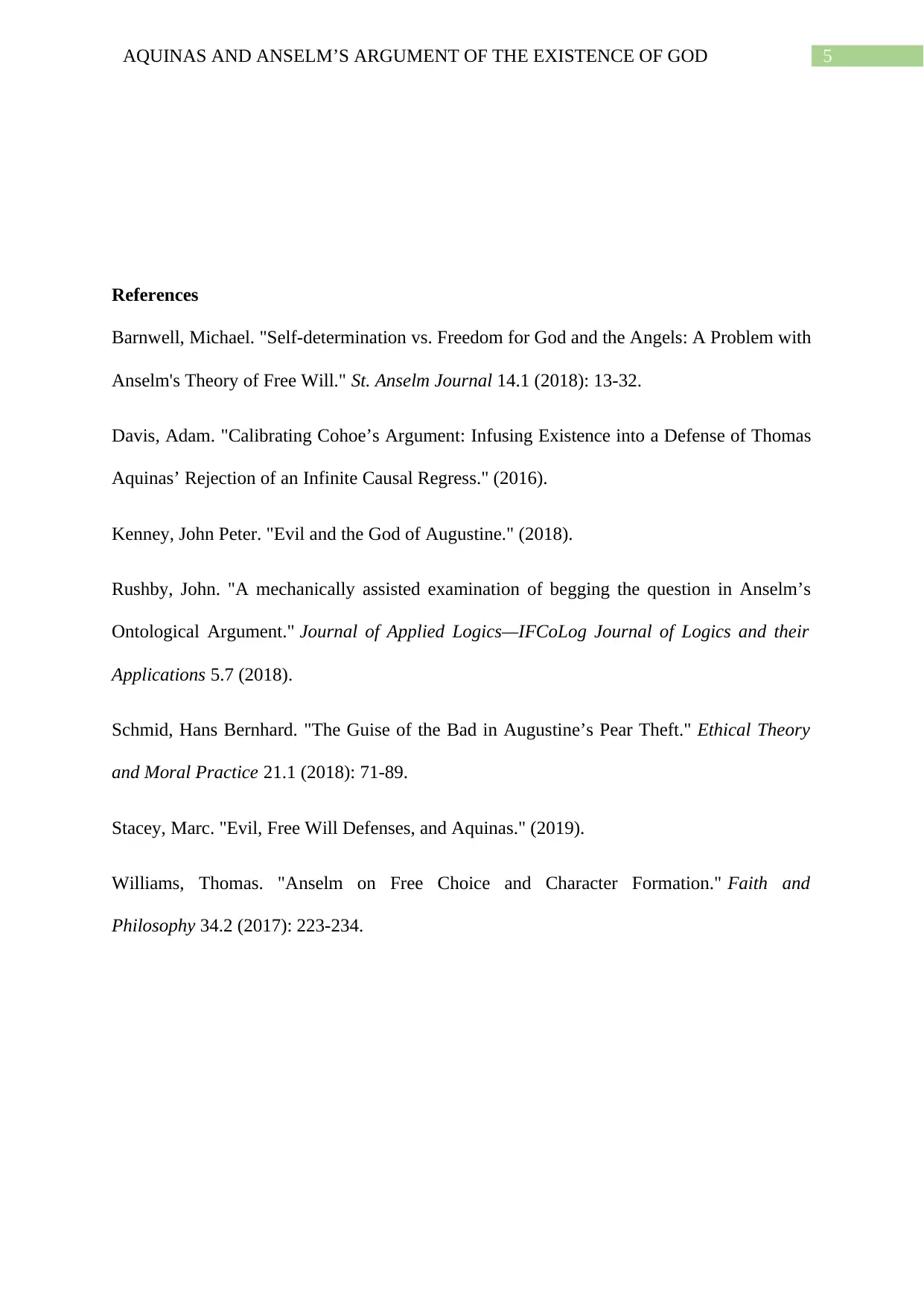
5AQUINAS AND ANSELM’S ARGUMENT OF THE EXISTENCE OF GOD
References
Barnwell, Michael. "Self-determination vs. Freedom for God and the Angels: A Problem with
Anselm's Theory of Free Will." St. Anselm Journal 14.1 (2018): 13-32.
Davis, Adam. "Calibrating Cohoe’s Argument: Infusing Existence into a Defense of Thomas
Aquinas’ Rejection of an Infinite Causal Regress." (2016).
Kenney, John Peter. "Evil and the God of Augustine." (2018).
Rushby, John. "A mechanically assisted examination of begging the question in Anselm’s
Ontological Argument." Journal of Applied Logics—IFCoLog Journal of Logics and their
Applications 5.7 (2018).
Schmid, Hans Bernhard. "The Guise of the Bad in Augustine’s Pear Theft." Ethical Theory
and Moral Practice 21.1 (2018): 71-89.
Stacey, Marc. "Evil, Free Will Defenses, and Aquinas." (2019).
Williams, Thomas. "Anselm on Free Choice and Character Formation." Faith and
Philosophy 34.2 (2017): 223-234.
References
Barnwell, Michael. "Self-determination vs. Freedom for God and the Angels: A Problem with
Anselm's Theory of Free Will." St. Anselm Journal 14.1 (2018): 13-32.
Davis, Adam. "Calibrating Cohoe’s Argument: Infusing Existence into a Defense of Thomas
Aquinas’ Rejection of an Infinite Causal Regress." (2016).
Kenney, John Peter. "Evil and the God of Augustine." (2018).
Rushby, John. "A mechanically assisted examination of begging the question in Anselm’s
Ontological Argument." Journal of Applied Logics—IFCoLog Journal of Logics and their
Applications 5.7 (2018).
Schmid, Hans Bernhard. "The Guise of the Bad in Augustine’s Pear Theft." Ethical Theory
and Moral Practice 21.1 (2018): 71-89.
Stacey, Marc. "Evil, Free Will Defenses, and Aquinas." (2019).
Williams, Thomas. "Anselm on Free Choice and Character Formation." Faith and
Philosophy 34.2 (2017): 223-234.
⊘ This is a preview!⊘
Do you want full access?
Subscribe today to unlock all pages.

Trusted by 1+ million students worldwide
1 out of 6
Related Documents
Your All-in-One AI-Powered Toolkit for Academic Success.
+13062052269
info@desklib.com
Available 24*7 on WhatsApp / Email
![[object Object]](/_next/static/media/star-bottom.7253800d.svg)
Unlock your academic potential
Copyright © 2020–2026 A2Z Services. All Rights Reserved. Developed and managed by ZUCOL.




